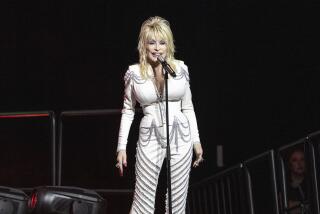Just a Touch : MAC Wants to Make You Up, Not Over
When Frank Toskan was a Toronto makeup artist, he couldn’t find cosmetics he liked. So he went into his kitchen and concocted a few.
Six years later, Toskan heads MAC (Make-Up Art Cosmetics), a Canadian-based company with 1991 sales of $25 million. Adulation from fashion heavyweights--coupled with the company name--has given birth to the media phrase “Big MAC Attack.”
The attack relies strictly on word of famous mouths, including those of makeup artists, models and entertainers--like Paula Abdul, Gloria Estefan and Lady Miss Kier.
Limited distribution enhances the aura of exclusivity, and Nordstrom is the only specialty store on the West Coast to carry the products. Despite the mystique, prices tend to be below designer level: lipsticks are $12; eye and lip pencils, $9; blush, $13; mascara, $12.
Inside any Nordstrom store the MAC counter is easy to spot. It’s where women usually stand elbow-to-elbow intently sampling rows and rows of tester lipsticks, eye shadows and blushes. Hip, friendly staffers, wearing form-fitting black and impressive cosmetic coverage, keep the activity rolling with information, advice and demonstrations.
Toskan says MAC sales assistants, including those in Henri Bendel and his new store in Greenwich Village, “must have makeup experience and be nice people.”
The 40-year-old executive prides himself on marching to a different drummer, and he believes the beat is heard by consumers. The company is best known for its more than 400 fashion colors, an extensive line of professional brushes and a collection of true matte lipsticks, including top-selling Russian Red and Chili. But “our customers don’t just support our colors, they support our philosophies,” Toskan says.
Consumers are most familiar with the company’s stand against animal testing. Proceeds from sales of “Cruelty Free Beauty” T-shirts (available on request from Nordstrom) go to Johns Hopkins and McGill universities. Proceeds from “Make Up, Make Out, Play Safe” shirts go to Design Industries Foundation for AIDS.
And, along with minimal packaging, there is a recycling program in which customers earn a free lipstick every time they return six plastic MAC containers.
Another company philosophy concerns the word make - over . It is banned. “I would be insulted,” says Toskan, putting himself in the customer’s skin. “Why should I be made over? Do I look that bad? We say makeup . May I help you with your makeup?”
He believes lipstick and mascara might be enough for some women. “A lot of counters will make you over by piling on 30 items. It should be only what the customer needs, likes and will use. If a customer goes home with something she doesn’t use, she’s not going to be a customer.”
For spring she could go home with colors and techniques inspired by the ‘30s and ‘40s. “It means lots of glamour,” Toskan explains. “There are smoky eyes and strong lips. Eyebrows are not plucked but they are extended. Cheeks are minimal, and the color should look like it’s coming from within the skin.”
The former makeup artist no longer mixes the colors. “But I’m in there testing all the time,” he says. He also makes personal appearances and will be in Los Angeles next month for the opening of the MAC store in West Hollywood.






